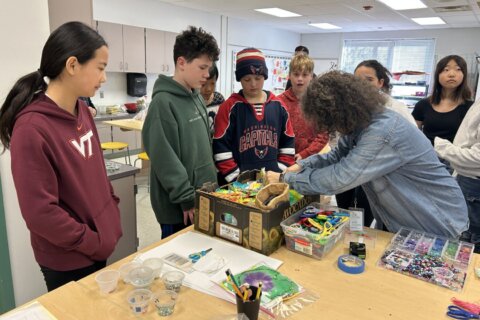Proposed updates to school policies in Fairfax County Public Schools would ban students from using social media sites for non-academic purposes during school hours and define when cellphones can be used during the school day in Virginia’s largest school district.
Fairfax County School Board members detailed proposed revisions to student rights and responsibilities during a work session this week.
The student rights and responsibilities manual for the 2021-22 school year said that with teacher approval, students can use personal devices “to access the Internet and collaborate with other students during the school day.”
A new proposed section of the school system’s policy defines when students can and can’t use their cellphones during the day. It includes a rule for elementary and middle school student phones to be silenced and put away during the school day, and for high school student phones to be silenced and put away during all instructional periods.
Under the revisions introduced, elementary students would only be able to use phones before and after school, and in class when teachers believe they’re the “most appropriate tool.”
Middle school students can use them before and after the last bell, and high school students would be permitted to use phones before and after the first bell, between classes and during lunch.
The proposed changes were discussed about two weeks after Herndon High School banned cellphone usage during the school day, because school leadership noticed an uptick in students using them during class.
School board member Elaine Tholen said Herndon Middle and High schools have both “pretty much implemented how [the proposed changes are] written” and have had positive results.
A school board vote on the proposed changes is scheduled for May 12. The school system considers revisions to its student rights and responsibilities polices annually.
“I personally think having people put phones away during instructional periods is completely appropriate,” Tholen said. “The teachers have the choice of whether they want to have the kids bring it out to use for part of that period.”
Michelle Boyd, the county’s assistant superintendent for special services, said the changes to the policy would help ensure teachers don’t have to use class time to address a student on their phone.
“Cellphones are great, but we still have to have the ability to engage. In short, I think the majority of our kids will have no problem at all,” Boyd said.
Vice chair Rachna Sizemore Heizer said the proposed changes would be a “culture shift,” particularly for high school students.
She said after consulting students, teachers and principals about cellphone use in schools, some students have become used to using their phones and teachers have become used to distributing forms digitally.
Board member Laura Jane Cohen recommended that the proposal be adjusted for students who need to access their phones during the day, such as students who may be diabetic and use their phones to monitor blood sugars.
Chairwoman Stella Pekarsky, meanwhile, said she’s worried that the changes may be unrealistic to implement. However, Boyd said most students currently comply with the policy adjustments being considered.
“We’re trying to work on the group that’s having some challenges,” Boyd said. “I do believe that by and large, the majority of our kids will have no problem with this at all. And we also have to remember, it’s the why we’re doing it, that we want to make sure that kids are available for instruction.”
Separately, new language added to a different proposed policy said that students can’t access social media websites during the school day “except where allowed by OCS and school administration. If allowed, social media activity must be limited to academic activities.”
Earlier this year, the county banned a handful of social media sites for students on the FCPS network and on laptops.
The school system also defined cyberbullying in its glossary of terms.








